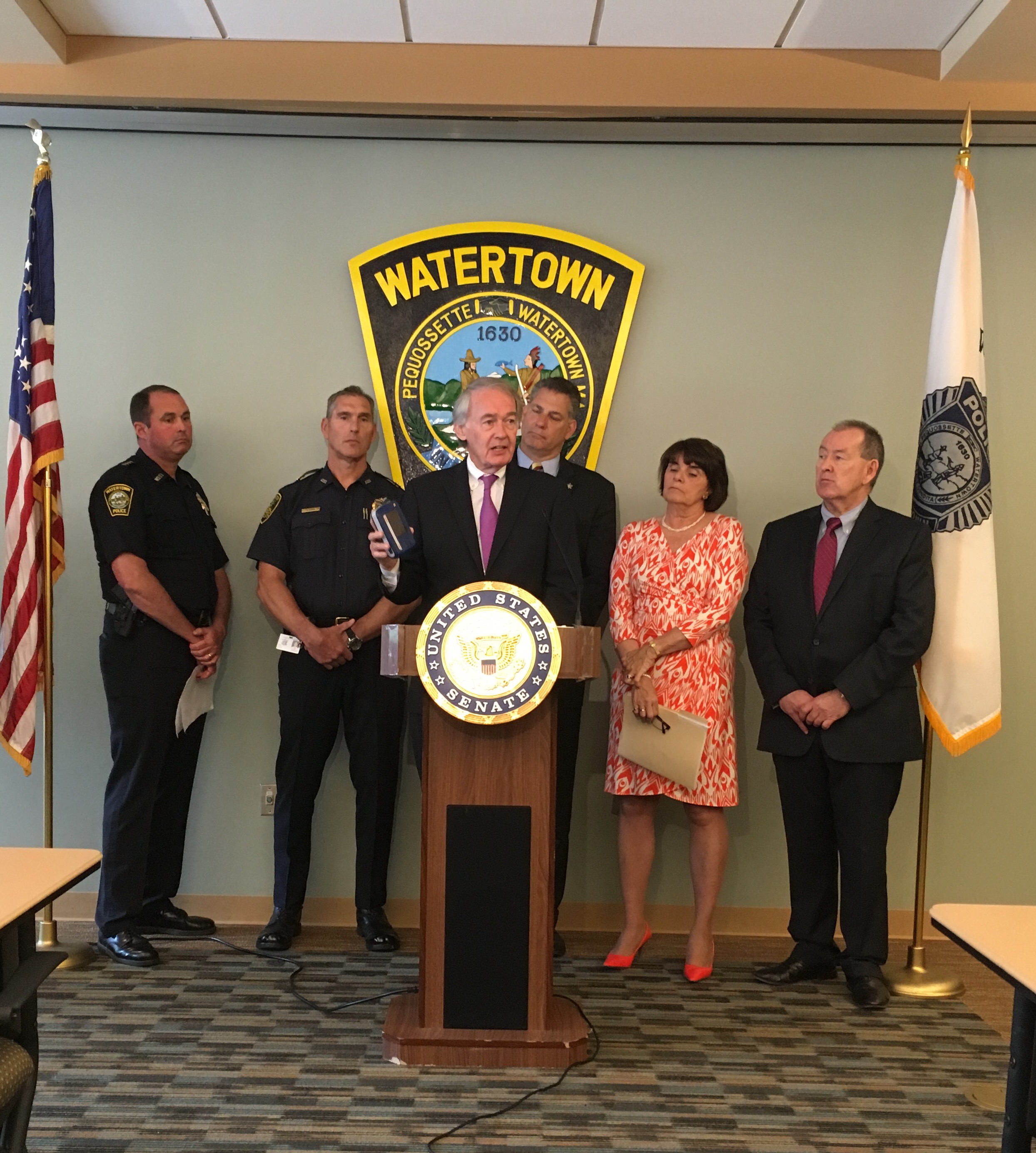Markey legislation would provide Customs and Border Protection the latest in portable chemical screening devices, additional scientists and resources to detect and intercept fentanyl and other synthetic opioids

(PHOTO CAPTION: Senator Edward J. Markey (D-Mass.) displays hand-held screening device with, from left to right, Watertown Police Chief Mike Lawn, Arlington Police Chief Frederick Ryan, Middlesex County Sheriff Peter Koutoujian, Middlesex County District Attorney Marian Ryan, and Watertown Town Manager Michael Driscoll)
Boston (May 30, 2017) – Speaking at the Watertown Police Department alongside law enforcement officials, Senator Edward J. Markey (D-Mass.) today called for passage of his legislation to help stop the flow of fentanyl into the United States from Mexico and China. The INTERDICT Act would provide U.S. Customs and Border Protection (CBP) tools such as handheld chemical screening devices and additional scientists to help detect and interdict fentanyl and other illicit synthetic opioids. Last week, Senator Markey led a bipartisan group of 14 other senators in calling on Senate Appropriations Committee leadership to increase funding for the screening capabilities of CBP to detect illicit fentanyl.
“We know fentanyl is coming across our border from Mexico and China, and we need to give our border agents the 21st century tools they need to halt the march of this deadly killer,” said Senator Markey. “The scanning technology to help save lives from fentanyl fits in the palm of a hand, and we should arm our border agents with this powerful weapon in this fight. And by stopping the flow of fentanyl at our borders, we can help protect our first responders here in Massachusetts from being exposed to this deadly drug. I will push for funding for the INTERDICT Act in next year’s budget, and will continue to work on a bipartisan basis to address this public health epidemic.”
“The tools the INTERDICT Act will provide for law enforcement at our border will allow for a safer and more effective way to detect fentanyl and target distribution operations,” said Middlesex County District Attorney Marian Ryan. “Every day across the country people suffer fatal fentanyl overdoses because, although it is not visually distinct from heroin, it can be deadly in much smaller amounts. In many cases experienced users and even dealers themselves have no way of distinguishing between fentanyl and heroin just by looking at it. This legislation will provide an important layer of defense against illicit drug dealers who are fueling the opioid crisis across our nation.”
“As Sheriff, I’ve seen firsthand the toll this horrible disease has taken on those in my custody and their families,” said Middlesex County Sheriff Peter J. Koutoujian. “Where fentanyl was previously used to lace heroin – it is now being used to replace heroin. If we stand a fighting chance in our daily battle to save lives, we need to act now. Senator Markey’s bill will do that by providing equipment to detect fentanyl at our borders.”
This bipartisan effort comes as law enforcement is warning about new and more-deadly varieties of fentanyl being found in the United States, including the emergence of Carfentanil, which is one of the strongest opioids in the fentanyl class of drugs. Carfentanil, which is an opioid used to tranquilize elephants, is 100 times more potent than fentanyl and has been found in New England and other states across the country.
Last year, Massachusetts suffered an estimated 2,069 opioid-related overdose deaths, with 69 percent of them involving fentanyl. Nationwide, Massachusetts ranks 2nd, per capita, in synthetic opioid deaths, which include fentanyl.
Specifically, the INTERDICT Act:
The INTERDICT Act is endorsed by the Massachusetts District Attorneys Association, Massachusetts Police Association, Massachusetts Coalition of Police, Federal Law Enforcement Officers Association, National Border Control Council, National Fraternal Order of Police, Ohio Fraternal Order of Police, and National Sheriff’s Association. Congresswoman Nikki Tsongas (MA-03) has introduced companion legislation in the U.S. House of Representatives.